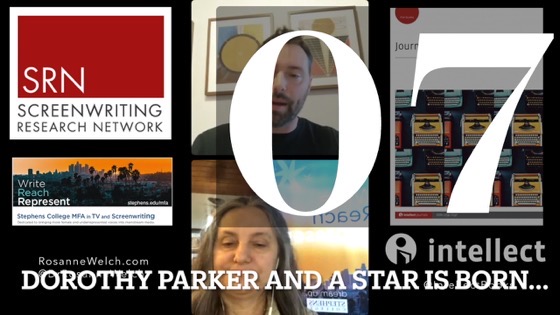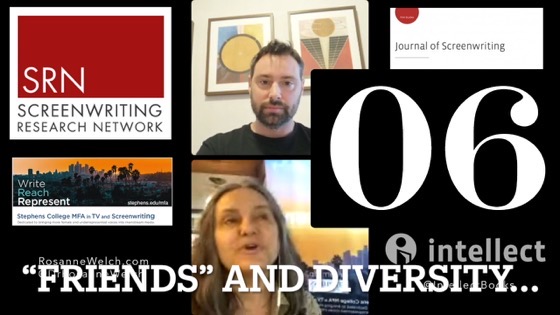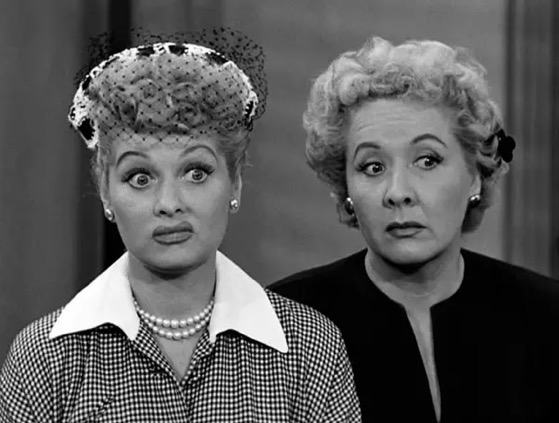Watch the entire presentation – Worry and Wonder | The Courier Thirteen Podcast | Episode # 29 here
Transcript:
Rosanne:…and then the second-biggest – and many people will tell you this – and it’s not just in classes and what you read – doing readership all over town – never write something that looks like I’ve seen it before, because why do I need you? I need to see something that’s different and that’s where you – your personal. perspective comes from, right? I need to see something I haven’t seen before and that doesn’t mean it has to be edgier and worse and mean and nasty, but there’s just – there’s an honesty to it that I didn’t expect. That’s what I want to see.
Host: ..and that’s perspective that gives you that.
Rosanne: Exactly.
Host: I feel like I’ve learned so much today.
It’s always fun to sit down with students and share stories about entering the television industry and how things work at all stages and I had that opportunity the other day.
Daniela Torres, a just-graduated (Congratulations!) student of the Columbia College Semester in LA program asked me to guest on a podcast she had recently begun hosting with another college student she met during her internship (good example of networking in action!).
We could have talked all morning (the benefit of a 3 hour class session) but we held it to about an hour and fifteen minutes or so. Hopefully, along the way I answered some questions you might have about how the business works. So often it amounts to working hard at being a better writer and gathering a group of other talented, hard-working people around you so you can all rise together.
Dr. Rosanne Welch is a television writer with credits that include Beverly Hills 90210, Picket Fences, ABCNEWS: Nightline and Touched by an Angel. She also teaches Television Writing and the Art of Film at San Jose State University.
Rosanne discusses what made shows like Beverly Hills 90210 compelling, what to do and not to do when attempting to pitch a show to broadcast or streaming, what most young writers neglect in their writing process, and much more!
The Courier Thirteen Podcast is available on YouTube, Spotify, Apple Podcasts, SoundCloud, and Audible.
Podcast: Play in new window | Download
Subscribe: RSS
![46 Screenwriting Mistakes: Write Something New... from Worry and Wonder | The Courier Thirteen Podcast [Video]](https://rosannewelch.com/wp-content/uploads/2022/04/rmw-courier-13-46.jpg)



![01 Introduction from When Men Forget Women: The Many Ways Male Screenwriters Fail to Mention their Female Colleagues [Video]](https://rosannewelch.com/wp-content/uploads/2022/04/rmw-scms-2021-01-1-1200x675.jpg)
![01 Introduciton from When Men Forget Women: The Many Ways Male Screenwriters Fail to Mention their Female Colleagues [Video]](https://rosannewelch.com/wp-content/uploads/2022/04/rmw-scms-2021-01.jpg)
![11 Casting Supporting Characters...from The Difficulties and Delicacies of Writing the First Female Doctor in 50+ years [Video] [Doctor Who]](https://rosannewelch.com/wp-content/uploads/2022/04/rmw-whocon-2021-chibnall-11.jpg)
![45 Screenwriting Mistakes: Lack of Research... from Worry and Wonder | The Courier Thirteen Podcast [Video]](https://rosannewelch.com/wp-content/uploads/2022/04/rmw-courier-13-45.jpg)
![02 My Interest In Torchwood from Why Torchwood Still Matters with Dr. Rosanne Welch, San Diego Who Con 2021 [Video]](https://rosannewelch.com/wp-content/uploads/2022/04/rmw-whocon-2021-torchwood-02.jpg)

![From Women in Early TV for the American Women Writers National Museum [Video]](https://rosannewelch.com/wp-content/uploads/2022/04/rmw-visible-stars-early-tv-19.jpg)


![10 Previous Hints At A Female Doctor ...from The Difficulties and Delicacies of Writing the First Female Doctor in 50+ years [Video] [Doctor Who]](https://rosannewelch.com/wp-content/uploads/2022/04/rmw-whocon-2021-chibnall-10.jpg)